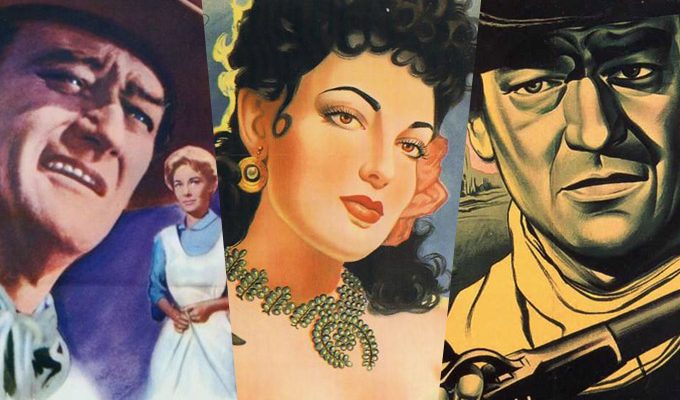 There are few figures in cinema history (perhaps only C.B. DeMille is a credible challenger) who have come to define the popular conception of the film director as wholly as John Ford. The notoriously irascible eyepatch-sporting monolith who essentially created the film Western as we know it, and made John Wayne the ultimate icon of twentieth century American masculinity along the way, is as central to Hollywood’s historical landscape as the sandstone buttes are to the vista of his beloved Monument Valley. So in light of the Museum of the Moving Image in New York running a retrospective of his films, we’ve used that as our overdue cue to take a look through this vast filmography.
There are few figures in cinema history (perhaps only C.B. DeMille is a credible challenger) who have come to define the popular conception of the film director as wholly as John Ford. The notoriously irascible eyepatch-sporting monolith who essentially created the film Western as we know it, and made John Wayne the ultimate icon of twentieth century American masculinity along the way, is as central to Hollywood’s historical landscape as the sandstone buttes are to the vista of his beloved Monument Valley. So in light of the Museum of the Moving Image in New York running a retrospective of his films, we’ve used that as our overdue cue to take a look through this vast filmography.
It’s an unenviable task: Ford’s catalogue is almost 150 films long, and even if many are now lost (very few of his early silents are still in circulation), the frenetic pace of his work during his most productive years means that isolating just 10 films is daunting. That’s partly down to the inevitable questions that any modern examination of Ford raises: about the nature of his own politics, about the validity of the vision of the Old West that he mythologized, and about the retroactive criticism of his oeuvre in terms of gender and race. But even in the most heated debates, Ford’s skill as a filmmaker simply cannot be denied, not even by his fiercest detractors. Whether he was a good man or not, he was a truly great director; here are the 10 films we feel most persuasively present that case.
 “The Informer” (1935)
“The Informer” (1935)
There are timeless classics in Ford’s resume, and there are also titles that feel their age. Unlike, say, ‘Liberty Valance,’ it’s hard to watch “The Informer” with a modern eye and not see overplayed sentimentality where contemporary reviewers saw “sensitivity,” and to feel its thematic heavyhandedness throughout. But we’d contend that it’s still central to an understanding of Ford’s oeuvre —attitudes may have changed since the film’s premiere, but outside the questionable politics and heightened style of acting, the film still offers numerous riches. An adaptation of the novel by Irishman Liam O’Flaherty, reportedly a cousin of Ford’s, the story had already been made into a film in 1929, right during the changeover to sound (the earlier version is in fact half silent and half talkie). But Ford’s film is a much more polished affair, shot in luscious black and white and using arresting compositions that owe as much to German Expressionism as to classical Hollywood tradition. But what is most striking today is how oddly un-commercial and atypical a story it is, and how determinedly brave a position it takes in making the informer of the title —the “rat,” so to speak— the most sympathetic character among a rogue’s gallery of rebels, prostitutes and political manipulators angling for advantage. A lot of that sympathy is due to actor Victor McLaglen, who despite the role’s bluster and theatricality (at the film’s famous conclusion, he clutches at his heart, cries out in an ecstasy of redemption and falls down dead at the feet of a statue of Christ —subtle it is not) still invests the doomed Gypo character with a wounded-animal quality as he struggles to comprehend the nature of his own treachery. The lunkish Gypo betrays the very code of masculinity-amid-conflict that Ford would return to thematically time and again, and yet it is him we feel for, and the thwarting of his simpleton goodness that the film most mourns. McLaglen earns his Best Actor Oscar in every frame, with “The Informer” also netting Ford the first of his four directing Oscars, along with Best Screenplay and Best Score.

